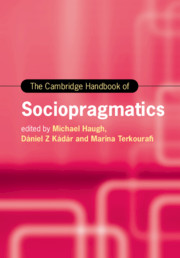Book contents
- The Cambridge Handbook of Sociopragmatics
- Cambridge Handbooks in Language and Linguistics
- The Cambridge Handbook of Sociopragmatics
- Copyright page
- Contents
- Figures
- Tables
- Contributors
- Acknowledgements
- 1 Introduction
- Part I Fundamentals of Sociopragmatics
- Part II Topics and Settings in Sociopragmatics
- Part III Approaches and Methods in Sociopragmatics
- 27 Interpersonal Pragmatics
- 28 Sociocognitive Pragmatics
- 29 Conversation Analysis and Sociopragmatics
- 30 Corpus Pragmatics
- 31 Variational Pragmatics
- 32 Historical Sociopragmatics
- 33 Emancipatory Pragmatics
- 34 Cross-Cultural and Intercultural Pragmatics
- 35 Second Language Pragmatics
- Index
- References
27 - Interpersonal Pragmatics
from Part III - Approaches and Methods in Sociopragmatics
Published online by Cambridge University Press: 01 April 2021
- The Cambridge Handbook of Sociopragmatics
- Cambridge Handbooks in Language and Linguistics
- The Cambridge Handbook of Sociopragmatics
- Copyright page
- Contents
- Figures
- Tables
- Contributors
- Acknowledgements
- 1 Introduction
- Part I Fundamentals of Sociopragmatics
- Part II Topics and Settings in Sociopragmatics
- Part III Approaches and Methods in Sociopragmatics
- 27 Interpersonal Pragmatics
- 28 Sociocognitive Pragmatics
- 29 Conversation Analysis and Sociopragmatics
- 30 Corpus Pragmatics
- 31 Variational Pragmatics
- 32 Historical Sociopragmatics
- 33 Emancipatory Pragmatics
- 34 Cross-Cultural and Intercultural Pragmatics
- 35 Second Language Pragmatics
- Index
- References
Summary
Since the 2010s, a number of scholars have explicitly worked with the term ‘interpersonal pragmatics’ in order to zoom in on the relational and interpersonal side of communication. The purpose of the chapter is to demonstrate how the research interest on the interpersonal and relational is inspired by (im)politeness, identity construction and communication studies in order to tackle questions about pragmatic variation and interpersonal effects. Interpersonal pragmatics does not propagate a particular methodology nor only one theory but is conceptualized as a perspective on the interpersonal side of language and communication. The chapter draws on and points to a number of earlier chapters dealing with key concepts for this field, such as (im)politeness, relational work, face, identity construction, roles and the social and historical embeddedness of communication. Key themes within interpersonal pragmatics are, among others, negotiations of agreement and disagreement, negotiations of (clashes of) norms and understandings of self and other in particular social contexts.
Keywords
- Type
- Chapter
- Information
- The Cambridge Handbook of Sociopragmatics , pp. 569 - 591Publisher: Cambridge University PressPrint publication year: 2021

